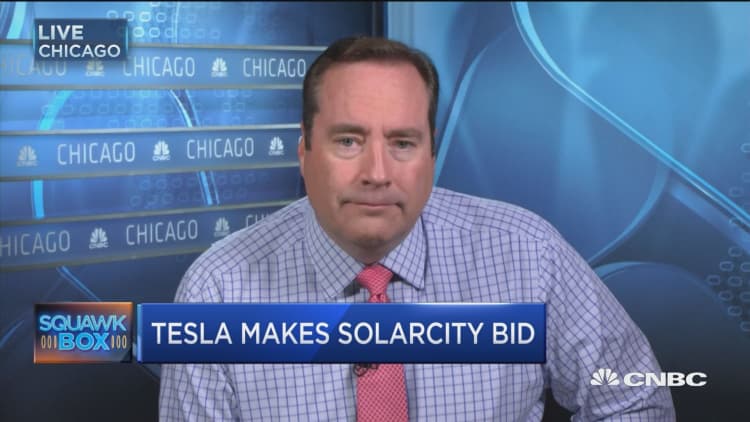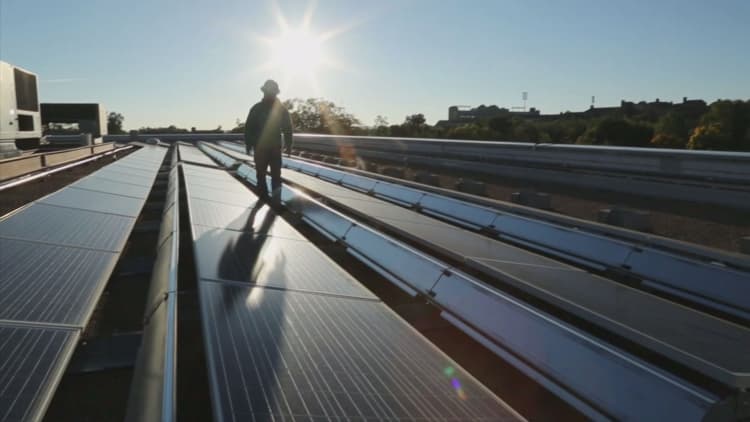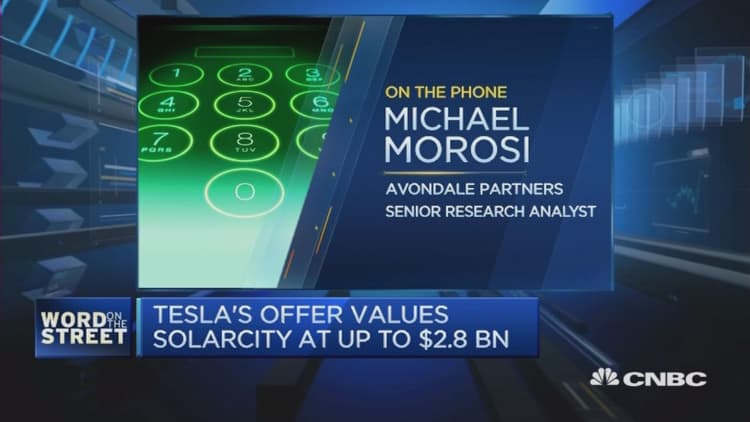


Tesla Motors buying SolarCity - a potential deal in which one of the country's best-known tech billionaires will effectively transfer cash from one of his pockets to another - sounds nuts.
Until you consider that Elon Musk, who's the biggest shareholder in each company, said a few weeks ago that we're all probably living in a giant video game.
Before even getting into the logic of the deal — an electric car company acquiring a solar panel distributor — you have to get past the absurd complexity of it.
Musk is co-founder, CEO and chairman of Tesla. He's also the chairman of SolarCity, and a cousin of the company's CEO Lyndon Rive.
Musk owns 21 percent of Tesla and 22 percent of SolarCity, stakes worth $6 billion and $533 million respectively, based on the company's share prices after the bid announcement.
Adding an additional level of complication, Musk is also CEO of SpaceX, a company that's been valued at $12 billion for its efforts to privatize space travel. And SpaceX reportedly owns a chunk of SolarCity's debt.
In disclosing the proposal to buy SolarCity on Tuesday for as much as $2.8 billion, Tesla filed a letter it wrote to SolarCity on June 20, that starts: "Dear Lyndon." Given their closeness, you'd think Musk could've hand-delivered the note.
But even if we all exist in a simulation, as Musk suggested at the Code Conference this month, he still has to obey securities laws. So he sent a professionally drafted letter to offer to buy SolarCity for $26.50 to $28.50 per share, representing a premium of as much as 35 percent over Tuesday's close.
SolarCity shares jumped 15 percent to $24.40 in extended trading. Tesla fell 12 percent to $193.50.
Tesla said that, in addition to benefiting both groups of shareholders, "a combination would allow our companies to build on our respective core competencies and remain at the forefront of delivering innovative approaches for sustainable transportation and energy."
And due to the "overlapping directorships," Musk and Antonio Gracias, who also sits on both boards, agreed to recuse themselves from voting on the proposal.
So what can Tesla and SolarCity do better together than they can alone?
Tesla said in the offer that it would be the "world's only vertically integrated energy company offering end-to-end clean energy products," meaning everything from your Model S car to your solar panel system and home power storage. The brands could also cross-sell the products and join forces in design, engineering, manufacturing and installations.
But SolarCity shares have gotten pummeled of late, plunging 62 percent in the past year, amid skepticism that the solar leasing model could generate profits. Hedge fund manager Jim Chanos has been a vocal short-seller, calling SolarCity a "subprime financing company."
"They're losing money on every installation and making it up on volume and that's a problem when you have a levered balance sheet," Chanos said in May. "I think SolarCity gets into financial trouble in 2016." Chanos, for the record, also said he was short Tesla.
Rive shot back at Chanos after those comments last year, telling CNBC that the business was quite the opposite of subprime because it saved consumers money on their electricity bills. SolarCity provides residential solar systems, handling installation and service with no down payment, then charging users a monthly payment for 20 to 30 years.
SolarCity's board still has to vote on the deal, and Tesla said its "intention is to proceed only on a friendly basis."
In other words, don't expect Elon to go hostile on Elon. Even if that would make for a tremendously entertaining video game.
Here's exactly what Musk said at the Code Conference, thanks to our friends at Recode:
The strongest argument for us being in a simulation is the following: 40 years ago, we had Pong. Two rectangles and a dot. Now, 40 years later, we have photorealistic 3D with millions playing simultaneously. If you assume any rate of improvement at all, then the games will become indistinguishable from reality, even if that rate of advancement drops by 1,000 from what it is now. It's a given that we're clearly on a trajectory that we're going to have games that are indistinguishable from reality. It would seem to follow that the odds that we're in base reality is one in millions.


